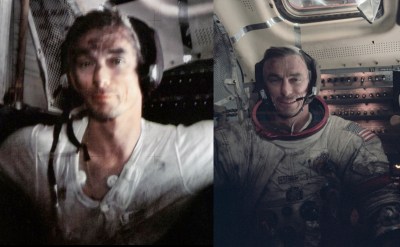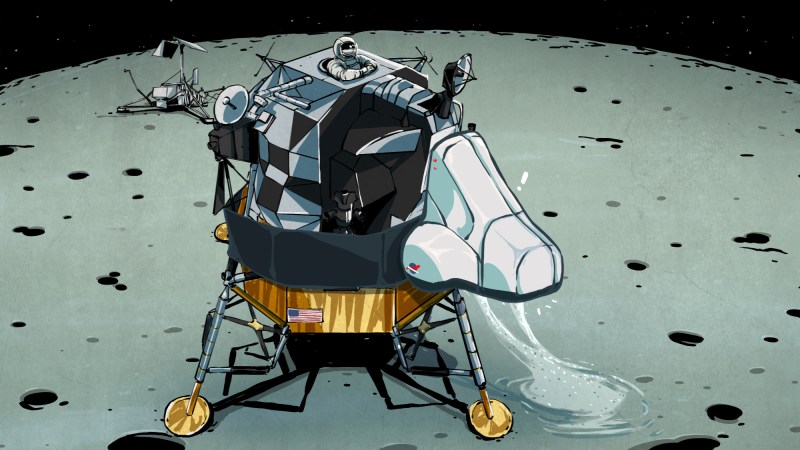In space, so the Alien tagline goes, nobody can hear you scream. One of the most memorable pieces of movie promotion ever, it refers to the effect of the vacuum of space on the things human senses require an atmosphere to experience. It’s a lesson that Joss Whedon used to great effect with the Serenity‘s silent engine light-ups in Firefly, while Star Wars ignored it completely to give us improbable weapon noises in space battles.
Sound may not pass through the vacuum of space, but that’s not to say there are not things other than light for the senses. The Apollo astronauts reported that moon dust released a smell they described as akin to burnt gunpowder once it was exposed to the atmosphere inside their lander, and by now you may have heard that there is a Kickstarter that aims to recreate the smell as a fragrance. Will it replace the cloying wall of Axe or Lynx Africa body spray that pervades high-school boys’ changing rooms, or is it a mere novelty?

Smells Like Moon Dust
The gunpowder smell experienced by the Apollo crews is likely to have been caused by oxygen-sensitive compounds in the moon dust being oxidised by their first exposure to an atmosphere after having accumulated through billions of years of our satellite’s buffeting by solar winds. By the time the samples reached Earth-based scientists this process was long over, so no smell remains for analysis. Even the vacuum containers in which the astronauts were to catch a sample for return to earth without being compromised by a vacuum failed to stop it, it’s thought that their seals were compromised by the unexpectedly pervasive nature of the dust. Thus the “Eau de Luna” perfume will be a creation based only on the astronauts’ recollections rather than an analysis of the smell they experienced.
Like a Locker Room in Orbit
Moon dust may so far be our species’ only encounter with another heavenly body, but that isn’t to say that space is not without other smells. The NASA astronaut Jerry Linenger described “a distinct, burnt-dry smell“in the airlocks of the Soviet/Russian Mir space station after returning from space, which is probably analogous to the Moon smell. But numerous accounts from the residents of Mir and other stations talk of smells from a completely different source; the astronauts themselves.
In a space station it is impossible to open a window for a bit of extra ventilation, so as the early stations gave way to continuously-crewed modular outposts that stayed aloft for many years their atmospheres reflected the accumulated biome of all that had been brought to them by their crews. Mir was said to be infested with mould and fungus towards the end of its life, and in 2019 there was concern that the same fate was befalling the ISS. It’s said that the fluid displacement effect of weightlessness adversely affects the human sense of smell, which is perhaps fortunate for those who have to live with it.
So the space fragrance probably remains the closest that most of us will ever come to leaving the atmosphere, thus it could smell of anything at all and none of us would ever smell the real thing and be able to ask for a refund if it didn’t match. Does it matter though, for the hacker who doesn’t quite have everything? No doubt we’ll catch that open-airlock scent at one or other of next year’s events.
















“…while Star Wars ignored it completely to give us improbable weapon noises in space battles.”
Funny you should say that.
https://youtu.be/T_bLVAqLZMY
In real life it might sound like whatever the ship’s computers think it should sound like, with cameras watching for laser blasts and synthesizing the appropriate sound, for optimal situational awareness.
Pretty sure earth based militaries already use radars that audibly announce if anything flies in that shouldn’t.
Lucasfilms with the copyright to, “pew, pew, pew”.
There’s a book series titled “Dark Space” where the ships are equipped with SISS or Sound In Space Simulator to provide audio cues to positions of other ships nearby and their weapons fire.
So there is a speed of sound in outer space. Who knew?
“Moon dust may so far be our species’ only encounter with another heavenly body”. False. Meteorites from Mars have been recovered on Earth.
So when the manned Mars probe actually reaches Mars, it will be a big green blob of fungus that will take over the planet and make future human habitation impossible, good to know.
What makes you think we can’t live on a fungus-infested blob? We’re doing okay on this one.
Fungus will reproduce and grow exponentially, consuming everything, unless we also introduce competition / predators that are present here on earth. But we don’t even know what fungi will be stowaways on this voyage so we don’t know how to compete or attack them.
So… deliberately take shiitake mushrooms. We can be the predators that have to keep them under control :)
After many months of astronaut food and no exercise the whole crew will get eaten by aspergillus and your mushrooms will cheer them on.
X: In my experience, trichs and shiitakes aren’t the best of friends.
Once it takes over Mars totally it will compete with itself for remaining resources so natural selection will boost evolution and if they are lucky the will make it to the intelligent form before Sun dies.
What makes you think humans will ever be able to survive such a journey? And be sane on arrival? Such misguided optimism!
Just pick the ones that are still sane after the phase 9 lockdown in 2025 :-D
++1
The sameness of a Doom color palette without the demon action.
>What makes you think humans will ever be able to survive such a journey?
The risks are mostly known and manageable, and humanity has no shortage of people willing to take serious risks to do cool shit.
>And be sane on arrival?
Hold on there. I don’t expect them to be sane on departure.
The radiation issues are a problem, but as far as sanity, there’s been plenty of voyages on Earth which have taken even longer. Another good analogy would be some of the Antarctic stations, where a group of people are trapped in a very small space, and they can’t really go outside.
At least astronauts on their way to Mars would have regular email contact with friends and family.
They most certainly can and do go outside in Antarctica, that comparison is nullified.
Being underwater is the only comparable environment and it must be in a structure with no method of escape in deep water to better simulate the danger aspect and the effects it has on the mind over time.
This should have been done already in preparation for a Mars mission but as far as we know it hasn’t.
I’ve had many occasions to be a medical shut-in. Long recoveries from surgeries where walking was difficult afterward, and other similar reasons. Funny thing was that after the post-op pain was dealt with, I didn’t mind sleeping late, waking in the afternoon, working at my computer or playing games on consoles.
A month could go by with just a few phone calls to family. The only reason to leave the apartment was when I went back for follow-ups with doctors. I let other people grab groceries for me and I enjoyed the down-time to let my brain play.
The stuff I had other people doing is stuff that a space agency would do; the food and things are stocked, I wouldn’t need to go EVA for groceries.
So, yeah, there are people uniquely situated and acclimated for long trips alone. You may say shut-in, I say Martian-in-training.
As a brown coat I appreciate the reference to Firefly keep it shiny! Job
:)
There is something that may be similar to the smell of space on earth. The smell in nuclear submarines returning from a patrol that may have lasted three months without any exchange of outside air. It’s unique and barf-inducing. It persists for years in sealed instrumentation cases.
https://charest.net/2018/12/30/the-smell-of-a-submarine/
That’s prolly what the ISS smells like, yes.
Holy Spherical Lunar Cow, Batman!
Their Kickstarter achieved over 292 times the initial goal!
“likely to have been caused by oxygen-sensitive compounds in the moon dust being oxidised by their first exposure to an atmosphere” is wrong. You will face palm when you read what I am about to say, as I am an actual former JPL/NASA engineer now old fart on the Internet.
Question: how did the astronauts get to the moon? Answer: in a rocket propulsed landing craft. During the landing phase, what burned fuel were they spewing all over the surface of the moon, hundreds of pounds per second? Aerozine 50 (a hydrazine based fuel). And what does Aerozine 50 smell like? Burned gunpowder. This is also why the airlocks in the space station also smell of the same fuel used to maintain altitude and position and why anything removed from the outside of the space station, especially anything located near the reaction thrusters and brought inside also smells of burnt gunpowder. Occam’s Razor, simplest answer.
The intro briefly mentioned the human element generating it own particular smells which I think would be the more serious problem. Listening to a WW2 veteran describe the smell of British subs as breathing dirty socks, makes me wonder if I could survive a trip to Mars. If you clean the air what would the air exchange capacity have to be? The food everyone is eating should be formulated to NOT produce any foul odors — chili mac anyone? Maybe you should just pass me the O2 bottle.